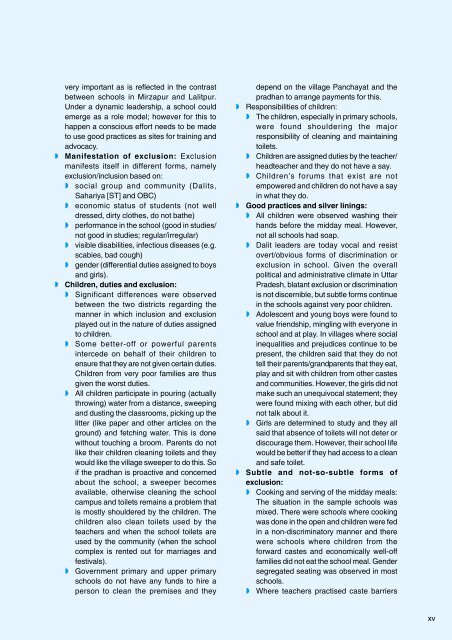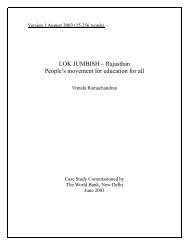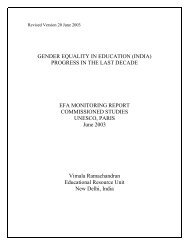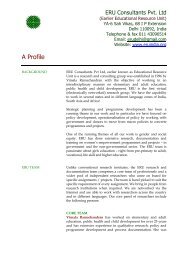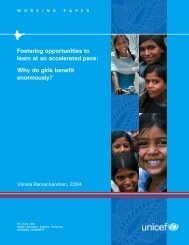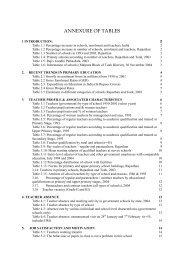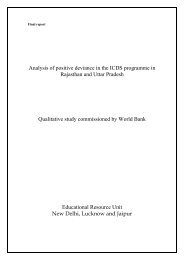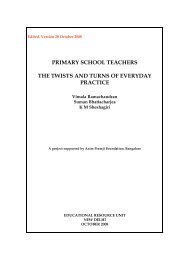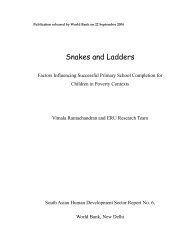EQUITY IN SCHOOL WATER AND SANITATIONsufficiently, it is believed that the presence of toilets<strong>and</strong> easy availability of safe dr<strong>in</strong>k<strong>in</strong>g watercontribute towards creat<strong>in</strong>g a positive environmentfor learn<strong>in</strong>g. In this study we tried to explore theextent to which the presence/absence of water<strong>and</strong> sanitation facilities <strong>in</strong>fluence regularattendance of students, especially of girls.Equally, food, water <strong>and</strong> sanitation are the threeimportant doma<strong>in</strong>s where <strong>in</strong>clusion/exclusionplays out. Hierarchies of caste/community aremanifested on the ground through social practicesrelated to eat<strong>in</strong>g, dr<strong>in</strong>k<strong>in</strong>g <strong>and</strong> the use of commonfacilities. Traditionally, certa<strong>in</strong> k<strong>in</strong>ds of work,especially that concern<strong>in</strong>g clean<strong>in</strong>g toilets, <strong>and</strong>disposal of dead animals, has been done by themost disadvantaged <strong>in</strong> the social hierarchy,namely the Dalits (SC). Though social reformmovements have made a big difference <strong>in</strong> manyparts of the country, rural areas cont<strong>in</strong>ue to lagbeh<strong>in</strong>d. Exist<strong>in</strong>g research shows that schools arenot free from such prejudices. With<strong>in</strong> the school,exclusion could also be subtle <strong>and</strong> not discernible<strong>in</strong> rout<strong>in</strong>e classroom observations or dur<strong>in</strong>g schoollevel <strong>in</strong>teractions. Therefore, this study explores<strong>in</strong>clusion <strong>and</strong> exclusion related issues <strong>in</strong> thesample schools through <strong>in</strong>teraction with parents,children, <strong>and</strong> teachers.Ma<strong>in</strong> f<strong>in</strong>d<strong>in</strong>gs <strong>and</strong> learn<strong>in</strong>gsEnrolment: There is a gap between thenumber of students enrolled <strong>in</strong> school, theaverage attendance as reflected <strong>in</strong> schoolrecords <strong>and</strong> the students present on the dayof visit. At best 83 per cent of the enrolledstudents were present on the day of visit <strong>and</strong>the worst case was of only 30.3 per centstudents be<strong>in</strong>g present. In Lalitpur theproportion of girls attend<strong>in</strong>g school is less thanthose enrolled, <strong>in</strong>dicat<strong>in</strong>g greater absenteeismamong girls. While District Information System forEducation (DISE) data <strong>in</strong>dicates that over90 per cent of the schools have separatetoilets for girls <strong>and</strong> boys, our study revealsthat only three of the 12 schools (25 percent) surveyed <strong>in</strong> Lalitpur <strong>and</strong> seven of the11 schools (80 per cent) surveyed <strong>in</strong>Mirzapur had function<strong>in</strong>g toilets for boys; thecorrespond<strong>in</strong>g numbers for girls’ toilets arefour out of 12 (33 per cent) for Lalitpur <strong>and</strong>eight out of 11 (80 per cent) for Mirzapur.Similarly, while almost 50 per cent of thetoilets were noted as be<strong>in</strong>g not clean, verydirty or extremely dirty/unusable <strong>in</strong> Lalitpur,the situation <strong>in</strong> Mirzapur was significantlybetter. The difference between the twodistricts can be attributed to the work donethrough the TSC programme <strong>in</strong> Mirzapur<strong>and</strong> the absence of the TSC programme <strong>in</strong>Lalitpur.Ma<strong>in</strong>tenance of facilities received specialattention <strong>in</strong> schools where the facilities werefound to be usable <strong>and</strong> clean. Children areassigned duties to clean, the garbage is clearedevery week, <strong>and</strong> the headteacher <strong>and</strong> villagepradhan take an active <strong>in</strong>terest <strong>in</strong> ensur<strong>in</strong>gcleanl<strong>in</strong>ess. Conversely, there was no systemfor ma<strong>in</strong>tenance <strong>in</strong> the schools where theheadteachers/pradhan did not take an active<strong>in</strong>terest <strong>in</strong> the overall hygiene <strong>and</strong> cleanl<strong>in</strong>essof the schools. In villages where TSC resulted<strong>in</strong> widespread use of toilets at home, thispractice was also carried to the school. On theother h<strong>and</strong>, the facilities were dirty <strong>and</strong>dysfunctional <strong>in</strong> schools <strong>in</strong> a majority of thevillages where the sanitation programme wasnot effective.Design: Not much plann<strong>in</strong>g goes <strong>in</strong>to thedesign, location <strong>and</strong> safety of toilets. In almostall the schools the toilets are small <strong>and</strong> thedoors open <strong>in</strong>wards, which means that the userhas to step on the pot to shut the door. If thetoilet is soiled, then it makes us<strong>in</strong>g it all themore difficult.Social <strong>in</strong>equality <strong>and</strong> exclusion: In theabsence of a total sanitation campaign <strong>and</strong> amovement for social <strong>and</strong> gender equality,schools mirror the <strong>in</strong>equalities present <strong>in</strong> thevillage lead<strong>in</strong>g to discernible exclusionpractices.Attitudes <strong>and</strong> prejudices of teachers: Theattitudes <strong>and</strong> beliefs of teachers reflected theirprejudices aga<strong>in</strong>st poor children <strong>and</strong> aga<strong>in</strong>stspecific social groups accentuat<strong>in</strong>gdiscrim<strong>in</strong>ation <strong>in</strong> schools. Equally, whereteachers have a positive <strong>and</strong> <strong>in</strong>clusive attitude<strong>and</strong> a sense of ownership, the schoolenvironment is positive. Involvement of thepradhan <strong>and</strong> other important stakeholdersmakes a big difference <strong>in</strong> the school <strong>and</strong> <strong>in</strong> thecommunity. The situation <strong>in</strong> the village <strong>and</strong> thecommunity <strong>in</strong> which the school is embedded isxiv
Overcom<strong>in</strong>g Exclusion <strong>and</strong> Discrim<strong>in</strong>ation <strong>in</strong> South AsiaCountry Report Bhutanvery important as is reflected <strong>in</strong> the contrastbetween schools <strong>in</strong> Mirzapur <strong>and</strong> Lalitpur.Under a dynamic leadership, a school couldemerge as a role model; however for this tohappen a conscious effort needs to be madeto use good practices as sites for tra<strong>in</strong><strong>in</strong>g <strong>and</strong>advocacy.Manifestation of exclusion: Exclusionmanifests itself <strong>in</strong> different forms, namelyexclusion/<strong>in</strong>clusion based on: social group <strong>and</strong> community (Dalits,Sahariya [ST] <strong>and</strong> OBC) economic status of students (not welldressed, dirty clothes, do not bathe) performance <strong>in</strong> the school (good <strong>in</strong> studies/not good <strong>in</strong> studies; regular/irregular) visible disabilities, <strong>in</strong>fectious diseases (e.g.scabies, bad cough) gender (differential duties assigned to boys<strong>and</strong> girls).Children, duties <strong>and</strong> exclusion: Significant differences were observedbetween the two districts regard<strong>in</strong>g themanner <strong>in</strong> which <strong>in</strong>clusion <strong>and</strong> exclusionplayed out <strong>in</strong> the nature of duties assignedto children. Some better-off or powerful parents<strong>in</strong>tercede on behalf of their children toensure that they are not given certa<strong>in</strong> duties.Children from very poor families are thusgiven the worst duties. All children participate <strong>in</strong> pour<strong>in</strong>g (actuallythrow<strong>in</strong>g) water from a distance, sweep<strong>in</strong>g<strong>and</strong> dust<strong>in</strong>g the classrooms, pick<strong>in</strong>g up thelitter (like paper <strong>and</strong> other articles on theground) <strong>and</strong> fetch<strong>in</strong>g water. This is donewithout touch<strong>in</strong>g a broom. Parents do notlike their children clean<strong>in</strong>g toilets <strong>and</strong> theywould like the village sweeper to do this. Soif the pradhan is proactive <strong>and</strong> concernedabout the school, a sweeper becomesavailable, otherwise clean<strong>in</strong>g the schoolcampus <strong>and</strong> toilets rema<strong>in</strong>s a problem thatis mostly shouldered by the children. Thechildren also clean toilets used by theteachers <strong>and</strong> when the school toilets areused by the community (when the schoolcomplex is rented out for marriages <strong>and</strong>festivals). Government primary <strong>and</strong> upper primaryschools do not have any funds to hire aperson to clean the premises <strong>and</strong> theydepend on the village Panchayat <strong>and</strong> thepradhan to arrange payments for this.Responsibilities of children: The children, especially <strong>in</strong> primary schools,were found shoulder<strong>in</strong>g the majorresponsibility of clean<strong>in</strong>g <strong>and</strong> ma<strong>in</strong>ta<strong>in</strong><strong>in</strong>gtoilets. Children are assigned duties by the teacher/headteacher <strong>and</strong> they do not have a say. Children’s forums that exist are notempowered <strong>and</strong> children do not have a say<strong>in</strong> what they do.Good practices <strong>and</strong> silver l<strong>in</strong><strong>in</strong>gs: All children were observed wash<strong>in</strong>g theirh<strong>and</strong>s before the midday meal. However,not all schools had soap. Dalit leaders are today vocal <strong>and</strong> resistovert/obvious forms of discrim<strong>in</strong>ation orexclusion <strong>in</strong> school. Given the overallpolitical <strong>and</strong> adm<strong>in</strong>istrative climate <strong>in</strong> UttarPradesh, blatant exclusion or discrim<strong>in</strong>ationis not discernible, but subtle forms cont<strong>in</strong>ue<strong>in</strong> the schools aga<strong>in</strong>st very poor children. Adolescent <strong>and</strong> young boys were found tovalue friendship, m<strong>in</strong>gl<strong>in</strong>g with everyone <strong>in</strong>school <strong>and</strong> at play. In villages where social<strong>in</strong>equalities <strong>and</strong> prejudices cont<strong>in</strong>ue to bepresent, the children said that they do nottell their parents/gr<strong>and</strong>parents that they eat,play <strong>and</strong> sit with children from other castes<strong>and</strong> communities. However, the girls did notmake such an unequivocal statement; theywere found mix<strong>in</strong>g with each other, but didnot talk about it. Girls are determ<strong>in</strong>ed to study <strong>and</strong> they allsaid that absence of toilets will not deter ordiscourage them. However, their school lifewould be better if they had access to a clean<strong>and</strong> safe toilet.Subtle <strong>and</strong> not-so-subtle forms ofexclusion: Cook<strong>in</strong>g <strong>and</strong> serv<strong>in</strong>g of the midday meals:The situation <strong>in</strong> the sample schools wasmixed. There were schools where cook<strong>in</strong>gwas done <strong>in</strong> the open <strong>and</strong> children were fed<strong>in</strong> a non-discrim<strong>in</strong>atory manner <strong>and</strong> therewere schools where children from theforward castes <strong>and</strong> economically well-offfamilies did not eat the school meal. Gendersegregated seat<strong>in</strong>g was observed <strong>in</strong> mostschools. Where teachers practised caste barriersxv


